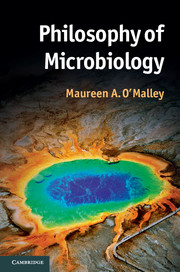Book contents
- Frontmatter
- Contents
- List of figures and tables
- Acknowledgements
- An introduction to philosophy of microbiology
- Chapter 1 Philosophy in microbiology; microbes in philosophy
- Chapter 2 Philosophical debates in high-level microbial classification
- Chapter 3 Philosophical debates in species-level microbial classification
- Chapter 4 Philosophical issues in microbial evolution
- Chapter 5 Microbial ecology from a philosophical perspective
- Chapter 6 Microbes as model biological systems
- Conclusion: further philosophical questions
- Glossary
- References
- Index
Chapter 1 - Philosophy in microbiology; microbes in philosophy
Published online by Cambridge University Press: 05 September 2014
- Frontmatter
- Contents
- List of figures and tables
- Acknowledgements
- An introduction to philosophy of microbiology
- Chapter 1 Philosophy in microbiology; microbes in philosophy
- Chapter 2 Philosophical debates in high-level microbial classification
- Chapter 3 Philosophical debates in species-level microbial classification
- Chapter 4 Philosophical issues in microbial evolution
- Chapter 5 Microbial ecology from a philosophical perspective
- Chapter 6 Microbes as model biological systems
- Conclusion: further philosophical questions
- Glossary
- References
- Index
Summary
This chapter aims to address a question that is central to the motivation for reading (and writing) the rest of the book: why is it valuable to examine microbiology philosophically? As an initial response to this question, I will outline two microbiological case studies. One concerns major evolutionary transitions and how these need a new framework when microbial metabolism is taken into account. The other is about magnetotactic bacteria and their interpretation in philosophy of mind. These cases show in general and specific ways how philosophy can interact fruitfully with microbiology.
Philosophy vis-à-vis microbiology: two sketches
The philosophical importance of microbiology needs further argument, and I will provide a basis for this via two case studies. Each will explore certain capacities of microbes and discuss them in relation to how the science has been interpreted philosophically. One will start from a planetary perspective while the other will enter the inner mental world. The first case concerns microorganismal phototrophy or ‘light eating’ in the form of oxygen-generating photosynthesis. I will discuss the biological production of oxygen as a major transition in evolutionary history and consider whether its exclusion from the main account of evolutionary transitions is justified. The second case is focused on a microorganism that has had a curious amount of attention in philosophy: the magnetotactic bacterium. Long an example for teleosemantics, which is the philosophical study of how mental content can be explained naturalistically, further analysis of this organism challenges its exemplar status and the standard adaptationist interpretations of its magnetotactic capacities. Both cases give some insight into the ways in which microbes can be useful to philosophy.
- Type
- Chapter
- Information
- Philosophy of Microbiology , pp. 16 - 44Publisher: Cambridge University PressPrint publication year: 2014
- 1
- Cited by



